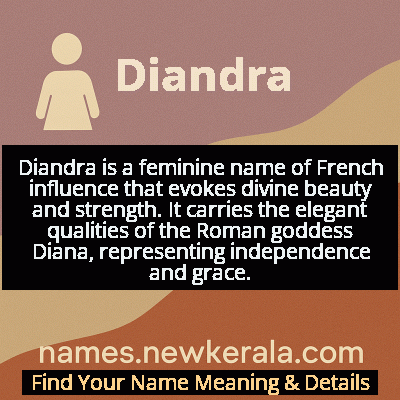Diandra Name Meaning & Details
Origin, Popularity, Numerology Analysis & Name Meaning of Diandra
Discover the origin, meaning, and cultural significance of the name DIANDRA. Delve into its historical roots and explore the lasting impact it has had on communities and traditions.
Name
Diandra
Gender
Female
Origin
French
Lucky Number
6
Meaning of the Name - Diandra
Diandra is a feminine name of French influence that evokes divine beauty and strength. It carries the elegant qualities of the Roman goddess Diana, representing independence and grace.
Diandra - Complete Numerology Analysis
Your Numerology Number
Based on Pythagorean Numerology System
Ruling Planet
Venus
Positive Nature
Harmonious, responsible, caring, and artistic.
Negative Traits
Overly idealistic, superficial, possessive, or jealous.
Lucky Colours
Pink, turquoise.
Lucky Days
Friday.
Lucky Stones
Diamond, turquoise.
Harmony Numbers
2, 3, 9.
Best Suited Professions
Artists, musicians, teachers, healthcare workers.
What People Like About You
Warmth, nurturing nature, artistic flair.
Famous People Named Diandra
Diandra Douglas
Actress and Author
American actress and author, known for her memoir and philanthropic work
Diandra Soares
Model and TV Host
Indian model and television host, prominent in fashion industry and LGBTQ+ advocacy
Diandra Florek
Actress
Polish actress known for theater performances and film roles
Diandra Newlin
Actress and Model
American actress and model known for horror film roles and television appearances
Name Variations & International Equivalents
Click on blue names to explore their detailed meanings. Gray names with will be available soon.
Cultural & Historical Significance
The name represents a bridge between ancient mythology and modern femininity, embodying qualities of strength, independence, and grace that have been valued across centuries. Its French association adds a layer of sophistication and international appeal, making it a choice that conveys both cultural depth and contemporary relevance. The name's evolution reflects changing attitudes toward female empowerment while maintaining connection to traditional symbols of feminine power and natural wisdom.
Extended Personality Analysis
Women named Diandra are often perceived as possessing a blend of strength and grace, reflecting their namesake's mythological qualities. They tend to be independent, self-reliant individuals with a natural elegance and poise that draws others to them. Typically, Diandras exhibit strong intuition and emotional intelligence, allowing them to navigate complex social situations with tact and sensitivity. Their personality often combines determination with compassion—they can be fiercely protective of those they care about while maintaining a gentle, nurturing side.
Many display creative talents and an appreciation for beauty in various forms, from art and nature to human relationships. This combination of inner strength and external grace makes them natural leaders who inspire loyalty and admiration. They often possess a quiet confidence that doesn't need to assert itself loudly but is evident in their actions and decisions. Their connection to the name's mythological roots may manifest as a love for nature, animals, or outdoor activities, and they frequently demonstrate loyalty and protectiveness toward their inner circle. The name suggests someone who is both grounded and aspirational, practical yet dreamy—a balance that makes them particularly compelling individuals.
Modern Usage & Popularity
Diandra remains an uncommon but distinctive choice in modern naming, particularly favored by parents seeking a name with classical roots but contemporary flair. Its usage peaked in the late 20th century, influenced by the popularity of Diana, Princess of Wales, though it never reached the mainstream popularity of its root name. Currently, it maintains a steady but rare presence in birth registries across English-speaking countries and Western Europe, often chosen by parents who appreciate its melodic quality and mythological connections. The name is particularly popular in Brazil and Portugal, where it has gained traction as an elegant international name. Its relative rarity makes it appealing to parents seeking a unique yet familiar-sounding name for their daughters, offering the sophistication of classical names without being overly common.
Symbolic & Spiritual Meanings
Symbolically, Diandra represents the union of divine femininity with earthly strength. The name evokes images of the moon's cyclical nature—representing intuition, mystery, and the subconscious. Like the huntress Diana, it symbolizes independence, protection of the vulnerable, and connection to the natural world. The name carries connotations of purity and clarity, much like moonlight cutting through darkness, suggesting someone who brings illumination and guidance. It also embodies the paradox of gentle strength—the ability to be both nurturing and formidable, compassionate and determined. In metaphorical terms, Diandra represents the modern woman who balances traditional feminine qualities with contemporary independence and self-determination, making it a name rich with symbolic meaning for the 21st century.

